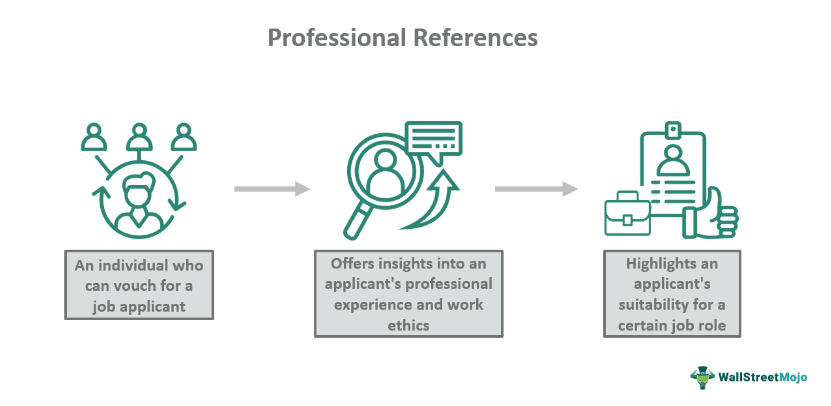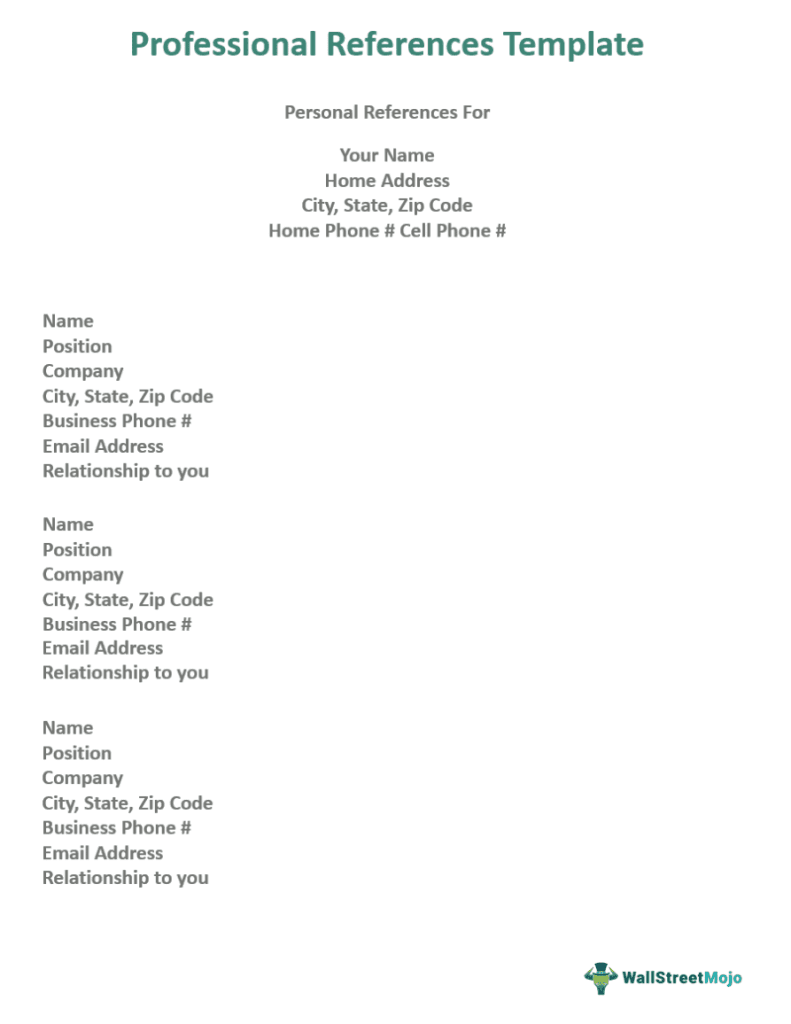Table Of Contents
What Is Professional References?
Professional references are individuals who can verify a job applicant's professional qualifications, character, and work ethic in a professional setting. They act as a crucial component in the job application process as they offer potential employers valuable information about a candidate's suitability for a given job role.

The references are usually former managers, peers, or mentors who have firsthand experience of working with the candidate. When requested by a prospective employer, the professional references in the resume will share their perspectives on the job seeker's skills, accomplishments, and ability to collaborate within a team. This feedback helps employers gauge the candidate's reliability and competence and influence the hiring decisions.
Key Takeaways
- Professional references are individuals who can attest to a job seeker's professional accomplishments, qualifications, and traits in a professional environment.
- They are a crucial element in the job application framework as they provide potential employers with knowledge about a job applicant's ability to execute a specific job role.
- They may provide insights into the candidate's professional skills, expertise, and work experiences.
- These insights are beneficial for potential employers as they offer an accurate picture of the applicant's prospective contribution to the organization.
Professional References Explained
Professional references are an essential aspect of the job application framework as they play a significant role in helping potential employers evaluate a candidate's suitability for a position. These references are individuals who can provide insight into a job applicant's professional accomplishments, character, and competence. Generally, the references are former colleagues, clients, and supervisors who have worked closely with the applicant and can offer valuable perspectives on their abilities.
The professional references in the resume can offer information about the candidate's work-related skills, achievements, and experiences. They may speak about the applicant's technical expertise, leadership abilities, communication and problem-solving skills, teamwork, and any other relevant qualities that are crucial for the position they are applying for. Furthermore, they may provide anecdotes and examples of the employee's contributions in the workplace.
These references offer potential employers valuable information on what the candidate can bring to the table. Moreover, they help in making a job applicant's resume strong, as positive feedback may enhance the worker's skills and credibility. Additionally, powerful references make a job seeker's profile stand out and may significantly impact the employer's hiring decisions.
Types
The types of professional references are:
- Supervisors and Managers: These references are former bosses or managers who have directly overseen your work. They can provide insights into the candidate's work ethic, leadership skills, and how they have contributed to their previous roles.
- Colleagues: Colleagues or peers who have worked alongside the applicant can vouch for the applicant's teamwork, collaboration, and how they interact with coworkers.
- Subordinates: If the applicant held supervisory roles in the past, subordinates they have managed can offer a perspective on the employee's leadership, mentoring, and ability to manage a team.
- Mentor: A mentor or advisor, especially in a professional or academic setting, can inform employers about a candidate's growth, development, and talents.
- Clients: If the applicant's work involves client interactions, a satisfied client or customer may be a firm reference. The client can also attest to the customer service skills, problem-solving abilities, and quality of work.
- Professors and Instructors: For recent graduates or those early in their careers, academic references from professors or instructors may help. They can demonstrate the candidate's knowledge and potential, especially if the field of study aligns with the job application.
- Business Partners: If candidates have been involved in partnerships or collaborations with other organizations or individuals, they can serve as references. Business partners may highlight the applicant's ability to work with external stakeholders.
Examples
Let us study the following examples to understand this concept:
Example #1
Suppose Jenny is applying for a marketing position in Annexe Company. Her professional references included her former supervisor, who talked about how she successfully managed marketing campaigns. It also included her former colleague, who highlighted her teamwork skills, communication skills, and her ability to collaborate on projects.
Additionally, she included a satisfied client who discussed how Jenny exceeded their expectations with her marketing strategies. These references collectively demonstrated Jenny's expertise and her ability to work well with her team and clients, making her a strong candidate for the job.
Example #2
When hiring an appropriate person, especially for remote roles, professional references are crucial. However, the creators of Weekday claim that when interviewing candidates for a position, more than 95% of recruiters don't ask for recommendations from prior coworkers. Weekday hopes to change that with an employment platform that emphasizes recommendations and references from users' social networks.
Weekday conducted a study on the recruiting practices of more than 200 businesses and discovered that the majority of them perform simple background checks on applicants to see if they have a criminal past or have actually worked for the companies listed on their resumes. Despite the fact that references are crucial for recruiting decisions, fewer than 5% of businesses conduct reference checks on prior coworkers in addition to standard due diligence.
Template
The template for professional references is given below:

How To Ask For?
The steps to ask for professional references are as follows:
- Job applicants must select individuals who know them in a professional capacity, like former managers, colleagues, or clients. They should be able to speak about the applicant's skills, work ethic, and character.
- Applicants may reach out to their potential references personally, either by phone, email or in person. They must state that they are applying for a job and would appreciate their support as a reference. Applicants must mention the specific job or industry so the references can customize their responses accordingly.
- References must provide their consent to be listed as a reference. They must be aware of the details of the job, including the job description, the company's name, and any specific points the applicant would like them to address.
- The applicants must keep the references updated on the job search progress. They may also provide the references with a copy of the resume and any other relevant materials to help them prepare.
- Applicants may share their potential employer's contact information with professional references so that they know where to expect the reference check.
Professional References vs Personal References
The differences between the two are as follows:
Professional References
- These references are individuals who discuss a job applicant's qualifications, work performance, and character in a work-related context.
- They are usually former supervisors, colleagues, mentors, or clients who have worked with the applicant in a professional setting.
- These references are highly relevant to job applications and interviews, as they can speak about an employee's skills, accomplishments, and how they perform in a professional environment.
- The references are considered more credible by potential employers because they can offer an objective perspective based on direct observations.
Personal References
- Personal references are individuals who can attest to a person's character, personal qualities, and how they conduct themselves in the non-professional aspects of life.
- These references may include friends, family members, or individuals who know the person outside of a professional setting. They speak about their character, values, and integrity.
- Potential employers may view these references as less objective since they are based on personal relationships.
- Personal references are more suitable for non-professional matters, like character references for rental applications or volunteer work.
